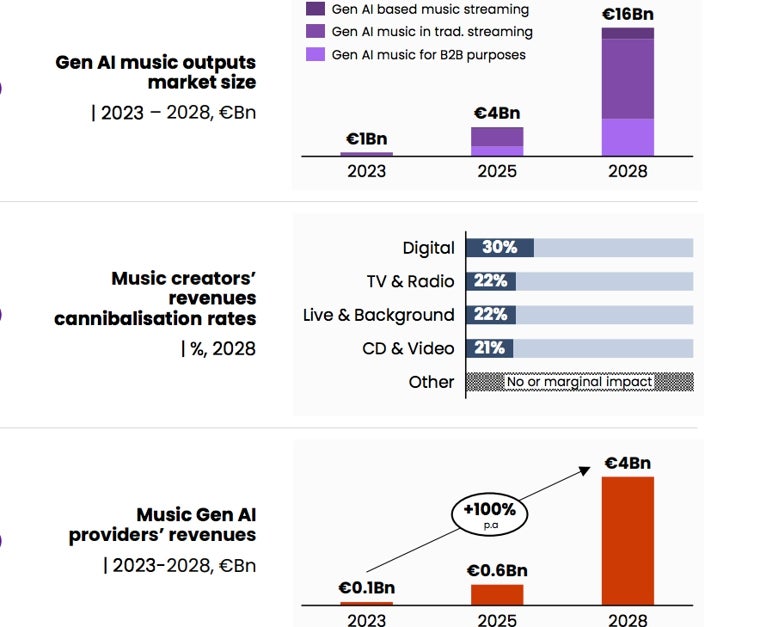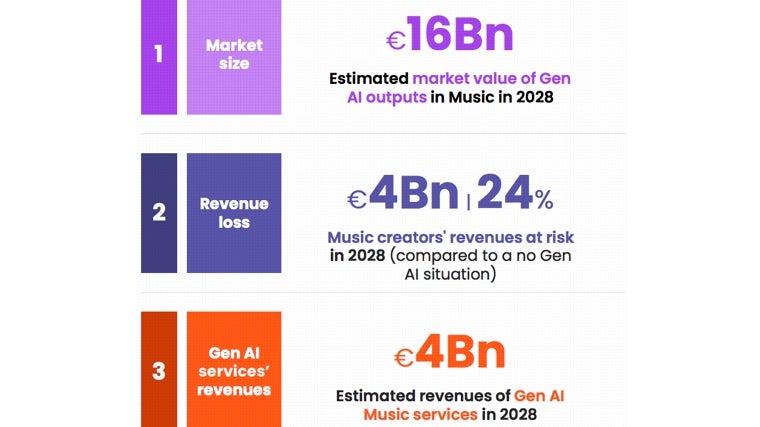«We learned from Lennon and McCartney, but we paid for it. Whether it was buying their records or listening to them on the radio, they got paid for it. But Artificial Intelligence is learning for free from all of us. This graphic and forceful phrase from Björn Ulvaeus, ABBA singer and President of the International Confederation of Societies of Authors and Composers (CISAC), summarizes the concern and indignation that has prompted the entity to prepare and present in an online press conference a very extensive study on the consequences of the application of Artificial Intelligence to the creation of music, and which has an alarming headline: Nearly a quarter of songwriters’ income will be at risk within four years.
“While the revenue of generative AI providers will see dramatic growth over the next five years, creators risk losing a large portion of their current revenue due to the substitutive impact of AI on human-created works.” , begins the report, the first to be done worldwide. «Despite providing the creative material that feeds the content market produced by generative AI, music creators and audiovisual creators risk losing 24% and 21% respectively of their income between now and 2028. This It is equivalent to an accumulated loss of 22,000 million euros in a period of five years (10,000 million euros in the music sector and 12,000 million euros in the music sector. audiovisual).
The study, based on market data, relevant benchmarks and extensive interviews with industry experts, indicates that the market for music and audiovisual content generated by AI will grow exponentially in the next five years, increasing from a current value of 3 billion euros to 64 billion euros in 2028, and establishes that, as a result of this exponential growth of the musical and audiovisual content market, the future income of AI providers generative will amount to annual revenues of 4,000 million euros in the music sector (compared to 100 million euros in 2023) and 5,000 million euros in the audiovisual sector (compared to 200 million euros in 2023). These revenues are derived directly from the unauthorized reproduction of creators’ works and represent a transfer of economic value from creators to AI companies.
In the music sector, the streaming and music library markets will be strongly impacted by AI. By 2028, generative AI music is expected to account for approximately 20% of the revenue of traditional music streaming platforms and about 60% of music library income. The expected loss of income will also be substantial for audiovisual creators. Translators and adapters of dubbing and subtitles will be the most affected, with a possible loss of 56% of their income, while screenwriters and directors could see their income reduced by between 15% and 20%.
With this panorama, and if the regulatory framework is not modified, creators will suffer losses on two fronts: “the loss of income caused by the unauthorized use of their works by generative AI models without any type of remuneration; and the replacement of their traditional sources of income due to the substitution effect of AI-generated products, which will compete with human-created works.
Evolution of investment in Generative AI
cisac

Evolution of the AI market, creators’ losses and profits for AI music providers
cisac

Outlook to 2028 on AI Market Size, Estimated Losses for Creators, and Profits for AI Providers
cisac
For the illustrious president of CISACBjörn Ulvaeus, “AI has the potential to open up exciting new opportunities, but we must accept that, if not well regulated, generative AI also has the power to severely harm human creators, their careers, and their livelihoods.” livelihood. Which of these two scenarios will prevail? This will largely be determined by the decisions made by policymakers in the legislative reviews taking place around the world right now. “It is essential that we get these regulations right, protect the rights of creators, and help ensure an AI environment that preserves human creativity and culture.”
The general director of CISAC; Gadi Oron, assures that There is a “fundamental fault” that is opening up in the market“with the works of creators being unfairly and unethically appropriated to increase the income of generative AI providers, leaving the creators themselves out of this growth. There is a critical message here for policymakers: they must act urgently to safeguard human creators, culture, and creativity. They must ensure that human creators are protected, can exercise their legal rights, and can demand transparency from AI services. “With these principles enshrined in the AI environment, creators and the tech industry can win instead of becoming a threat to our culture and our creative sector.”
In the same line, Ángeles González-Sinde Reig, Vice president of CISAC and film director and screenwriter, she recalls that “there is enormous concern that, in the race to exploit and monetize generative AI, creators are treated as something secondary, without the right to authorize the use of their works.” , without being protected by transparency rules or without being able to receive fair remuneration.
In conclusion, the general director of the General Society of Authors and Editors (SGAE) Cristina Perpiñá-Robert points out that “the CISAC report confirms that the cultural sector is in a very complicated situation if the work of the authors is not respected. Throughout history, copyright has adapted to different technological advances. Generative AI produces large-scale works that copy and replace the works of the original creators. “This is causing enormous economic, cultural and social damage.”
#musicians #income #risk #due #Artificial #Intelligence

